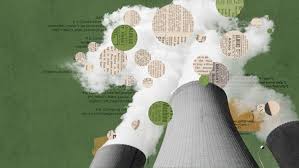
According to a research released on Tuesday, a number of the largest listed businesses' combined carbon emissions reduction objectives are too low, which means they are not doing enough to mitigate the most severe effects of climate change.
According to a survey conducted by Carbon Market Watch and the nonprofit NewClimate Institute, 51 corporations have pledged to decreasing their emissions by an average of 30% by 2030, which is less than the 43% required to keep global warming to 1.5 degrees Celsius (2.7 Fahrenheit) by the year 2050.
Even though 19 companies had raised their targets in the previous two years, many of them were characterised as unclear, related to only a portion of their operations, or dependent on offsets rather than reducing emissions, resulting in effective targets ranging from 5% to 20%, the report revealed.
According to the survey, energy conglomerates Enel and Iberdrola, food company Mars, and retailer H&M Group were among the top performers. These companies had pledged to reduce their emissions by a range of 50% to 64%.
"Four years into the critical decade for action on climate change, some companies have understood the need to set 2030 targets that are aligned with the latest climate science and substantiated by credible measures to achieve them," NewClimate Institute's Frederic Hans said.
"However, there still is a concerning lack of commitment and urgency from too many companies to undertake credible climate action."
How can one determine whether a coffee plant is experiencing the consequences of climate change?
To achieve the mid-century target of net zero greenhouse emissions by the end of this decade, scientists estimate that emissions must be about halved. Both average temperatures and pollutants reached record highs last year.
The world will likely warm by 2.5–2.9C over pre-industrial levels as a result of governments' commitments, known as Nationally Determined Contributions. This will increase the likelihood of catastrophic floods, droughts, and wildfires.
The third version of the NGOs' Corporate Climate Responsibility Monitor, which focuses on the largest businesses by revenue in industries that are critical to climate change, was released on Monday.
According to Carbon Market Watch's Benja Faecks, it demonstrated the necessity for stronger climate legislation.
"Civil society, investors, and governments depend on transparent and credible rules to distinguish well-substantiated transition plans from those that remain inadequate and prone to greenwashing," Faecks said.
(Source:www.economictimes.com)
According to a survey conducted by Carbon Market Watch and the nonprofit NewClimate Institute, 51 corporations have pledged to decreasing their emissions by an average of 30% by 2030, which is less than the 43% required to keep global warming to 1.5 degrees Celsius (2.7 Fahrenheit) by the year 2050.
Even though 19 companies had raised their targets in the previous two years, many of them were characterised as unclear, related to only a portion of their operations, or dependent on offsets rather than reducing emissions, resulting in effective targets ranging from 5% to 20%, the report revealed.
According to the survey, energy conglomerates Enel and Iberdrola, food company Mars, and retailer H&M Group were among the top performers. These companies had pledged to reduce their emissions by a range of 50% to 64%.
"Four years into the critical decade for action on climate change, some companies have understood the need to set 2030 targets that are aligned with the latest climate science and substantiated by credible measures to achieve them," NewClimate Institute's Frederic Hans said.
"However, there still is a concerning lack of commitment and urgency from too many companies to undertake credible climate action."
How can one determine whether a coffee plant is experiencing the consequences of climate change?
To achieve the mid-century target of net zero greenhouse emissions by the end of this decade, scientists estimate that emissions must be about halved. Both average temperatures and pollutants reached record highs last year.
The world will likely warm by 2.5–2.9C over pre-industrial levels as a result of governments' commitments, known as Nationally Determined Contributions. This will increase the likelihood of catastrophic floods, droughts, and wildfires.
The third version of the NGOs' Corporate Climate Responsibility Monitor, which focuses on the largest businesses by revenue in industries that are critical to climate change, was released on Monday.
According to Carbon Market Watch's Benja Faecks, it demonstrated the necessity for stronger climate legislation.
"Civil society, investors, and governments depend on transparent and credible rules to distinguish well-substantiated transition plans from those that remain inadequate and prone to greenwashing," Faecks said.
(Source:www.economictimes.com)





